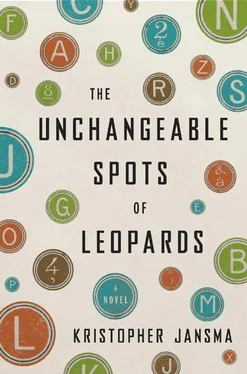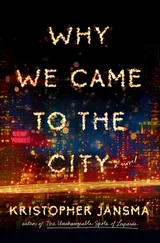Slowly Tina and I take our seats and pretend to be watching Carsten’s DVD — which seems like the most unassumingly American thing to be doing.
“She loves this stupid movie,” Tina mutters.
“She’s seen it before?” I say in surprise.
“It was on television in the hotel the other night when she was too hungover to go out. The main guy is Tamil. He’s very poor but he’s been sent to the big city full of Sinhalese, so he can learn to be a painter. Have you seen this thing they do here where they highlight the frescoes in their temples with gold leaf?”
I cough in surprise and then study the little screen closely, watching as the Tamil boy paints gold onto the horns of a strange minor deity on the wall of a Buddhist temple. There is a crack in the wall, and he suddenly notices a great brown eye staring through it at him. The music swells so loudly that we can hear it through the headphones on the floor.
“And there’s the girl he’s in love with. She’s Sinhalese, from a very rich family. And she’s supposed to marry this member of the former royal family in Anuradhapura, of course, but she’s in love with painter boy.”
I watch closely as they sing to each other through the hole in the wall. Once, long ago, I wrote a novel with this exact moment in it. The only copy I had had been destroyed, though this moment and some surrounding fragments survived as part of the only story I’d ever published, in a tiny literary review. Was it possible that somehow my story had made its way into the hands of some Bollywood writer, halfway around the world? Had someone plagiarized me ? Or had my original idea been so hackneyed and cliché that it had simply resurfaced? Could I have plagiarized it myself, from some book of myths I’d read or some film I’d seen when I was growing up? Was it still plagiarism if I’d done it unknowingly? Does it sting like this because I’ve been robbed or because it was never mine to steal? I watch their eyes trying to catch each other’s through the tiny crack in the wall. Maybe an idea, like love, cannot ever be stolen away, just as it cannot ever have belonged to me and only me.
Just then the door opens loudly. The observation car fills quickly with mustachioed Sri Lankan soldiers. Two of them begin barking at Tina and me, “Passport, ma’am! Passport, sir! We need to see identification.”
Another soldier storms over to the nun and demands she hang up her phone, which results in more frantic screeching in Italian, this time it sounds more like curses than blessings.
Still more soldiers are bringing the Tamil boy to his feet. Can he be even eighteen? He looks at me suddenly, with those same cocksure eyes, and as the men are pulling at him to remove my jacket, the boy does an astonishing thing. He looks away from me and back at the book in his left hand and he reads. His hazel eyes move left to right across the page. I watch his dark lips part as he sounds out the words in front of him. Given how rough his English had been earlier, I have to guess that he can understand only a fraction of what he is reading. It seems a completely insane thing to do, and the men grab him roughly for not coming easily. Why would he do it? I barely have a second to process it before the book and my coat are being thrown roughly to the floor. The soldiers rush the boy back through the open doors and then they’re gone.
“What. The hell. Was that ?” Tina says in complete disbelief.
“I’m… I’m sure it’s nothing serious. These guys, they just act really blustery probably to scare everyone into respecting them.”
“Where’s Carsten?” Tina says suddenly.
“Carsten’s fine,” I say. “These people. Even if these are bad people, they’re not going to hurt—”
Americans is about to be the next word out of my mouth, but it dies on the way up my throat.
“He looked very young,” Tina says.
“I’m sure he’ll be fine,” I lie.
Just before the end of the civil war, when skirmishes were breaking out everywhere, the Sinhalese government rounded up native Tamil civilians into “no-fire” zones, where they were promised protection from the fighting. The concerned government then proceeded to shell the no-fire zones until they looked like the surface of the moon. Soldiers chased the survivors to the beaches and slaughtered them in the rocky surf until the water had gone red. The leaders of the Tigers turned themselves in, hoping to save the few Tamil civilians who had been captured. The Sinhalese executed every last one of these leaders and then they killed every single captured civilian.
I want to tell Tina this. Then I think maybe it’s better if she doesn’t know it. I wish that I could un -know it. I’d give all the money in my PayMeNow account to un-know it. The nun is praying again, crying more than she had when she thought she had nearly died. I wonder again why she felt something and I didn’t. I wonder if, even believing in a better world after this one, she loves this place more than I have ever loved anything in my life. I don’t know.
All I really know is that I feel something now. I feel a sinking horror as I watch the soldiers, out in the rain, shove the boy roughly into the back of the Jeep and begin to drive away. Happy music plays out of the headphones on the floor as, I presume, the Tamil boy in the movie has at last run off into the sunset with his one true love. Tina clenches at my hand and I grip her like a life raft. I tell myself that it’s going to be fine, but I can’t shake this horrible feeling. There was something about the way that the boy’s lips were moving as he read the book. Something that made me think that he knew he was about to die. And that he wanted one of Jeffrey’s lines to be the very last to pass his lips.
There is a long, long nothing, and then the train begins to move again.
[He] met his own image walking in the garden. / That apparition, sole of men, he saw. / For know there are two worlds of life and death: / One that which thou beholdest; but the other / Is underneath the grave, where do inhabit / The shadows of all forms that think and live, / Till death unite them and they part no more. .
— PERCY BYSSHE SHELLEY, PROMETHEUS UNBOUND
Down one lane of the bustling Kumasi Central Market I see him. Or, rather, I see me. In the swirl of surly northern grocers and Ashanti women with baskets on their heads and a boy who juggles for ten pesewa pieces — there I am. Or there he is. An obruni . A white man. My age, in Brooks herringbone tweed, despite the fact that in August, it is 82 degrees in Ghana. We have the same haircut. His mouth twists in the same puzzled amusement that mine does as he inspects a smooth teak carving of a jungle cat. I’ve been in Africa five weeks, which is five weeks too long. It’s the heat, surely. Or something in the food. Or whatever it is that Tina has been rolling in her cigarettes. And last week I drank gin with ice in it — why? Just frozen cubes of salmonella, no doubt! It is not just that this other man is white — though there are rarely white men in the marketplace. The tubby British tourists, the unwashed backpackers, the dreadlocked college dropouts — they all generally avoid this place. This is the real Kumasi. The man takes a notebook out of his left breast pocket. It is the same leather-bound notebook that I keep in my left breast pocket. He scribbles onto it with the same nib-point pen. This is it, I think, the parasites have wormed their way into your brain, you phenomenal fool . Christ, even our shoes are identical — weathered buck-leather tennis shoes. I haven’t replaced mine in fifteen years. I’ve tried; they don’t sell them anymore. The only difference I can seem to find is that his wristwatch is silver and mine is gold. As I’m standing there, holding a melon or something in my left hand, he turns and catches my eye. He sees me. Then he quietly turns down a side alley and disappears.
Читать дальше











